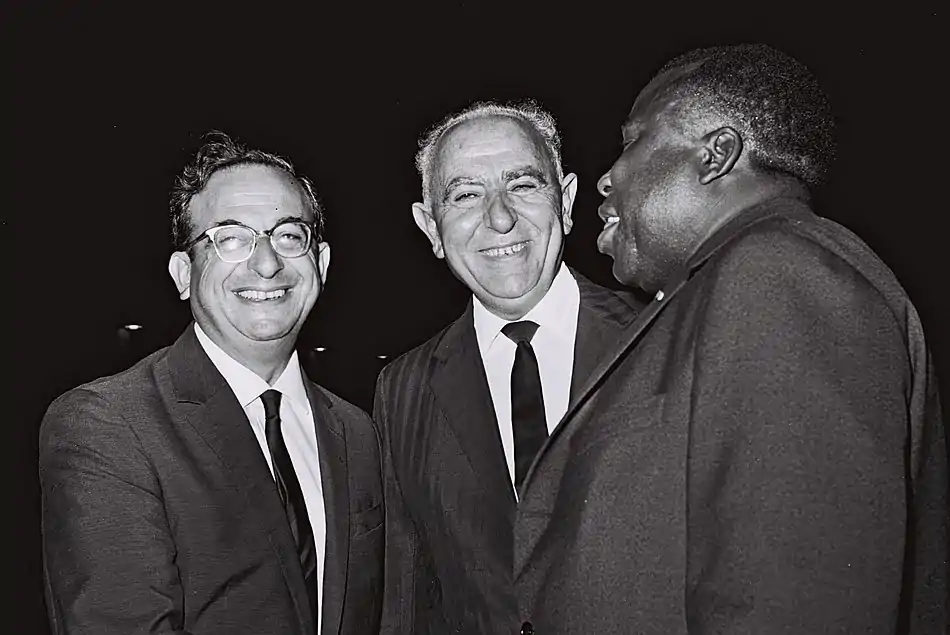Sylvestre Mudingayi
Sylvestre Mudingayi (born 11 November 1912) was a Congolese politician who served as the President of the Senate of the Democratic Republic of the Congo from October 1965 until June 1967.
Sylvestre Kongolo Mudingayi | |
|---|---|
Sylvestre Mudingayi in Israel, August 1966 | |
| President of the Senate of the Democratic Republic of the Congo | |
| In office September 1965 – 24 June 1967 | |
| Preceded by | Isaac Kalonji |
| Succeeded by | position abolished[lower-alpha 1] |
| Personal details | |
| Born | 11 November 1912 Lusambo, Kasai Province, Belgian Congo |
| Political party | Parti National du Progrès Front Démocratique Congolais |
Biography
Sylvestre Mudingayi was born on 11 November 1912 in Lusambo, Kasai Province, Belgian Congo[1] to a Luba family.[2] In 1932 he became a chief clerk at the Banque du Congo Belge. He was a member of the évolué social class.[3] In 1945 he chaired the Cercle d'Agrément Prince Léopold III de Lusambo.[4]
Political career
Mudingayi was classified by Christian missionaries as a "socialist" due to his advocacy for the establishment of secular schools.[1] In 1953 he traveled to Belgium where he was received by the Liberal Party.[5] In March 1959 he was appointed by the Governor-General of the Congo to serve on the consultative Conseil de Gouvernement.[6] Mudingayi later became president of the Kasai chapter of the Parti National du Progrès (PNP). He founded and became editor of the leftist anti-clericalist newspaper La Lumière, a bimonthly publication of the party.[1]
Mudingayi participated in the Belgo-Congolese Round Table Conference of 1960 that earned the Congo's independence.[7] While campaigning for the PNP in the Luputa region of Kasai in March for the upcoming elections, he was assaulted by opposing political activists.[8] His injuries were severe and he was forced to make a near-total withdrawal from politics.[7]
In September 1965 Mudingayi was elected President of the Senate as a member of the Front Démocratique Congolais (FDC) in a surprise victory over the incumbent, Isaac Kalonji, 57 votes to 54.[9] He served until the enactment of a new constitution on 24 June 1967.[10]
Notes
- The Senate was permanently dissolved and was not reinstated until 2003 under the chairmanship of Pierre Marini Bodho.
Citations
- CRISP 1959, paragraph 64.
- Makombo 1998, p. 460.
- Makombo 1998, p. 314.
- Tousignant 2009, p. 98.
- Makombo 1998, p. 226.
- Artigue 1960, p. 84.
- House Committee on Foreign Affairs 1960, p. 42.
- Wa Tshibangu 1976, p. 145.
- African World 1967, p. xxiii.
- Senat 2010, p. 2.
References
- "L'affaire Kalonji et les problèmes du Kasai". Courrier hebdomadaire du CRISP (in French). Centre de recherche et d'information socio-politiques (31): 9–18. 1959. doi:10.3917/cris.031.0009.
- Artigue, Pierre (1960). Qui sont les leaders congolais? (in French). Éditions Europe-Afrique.
- "Discours Prononce par le President du Senat a L'Occasion de la Commemoration du Cinquantenaire de la Creation du Senat de la Republique Democratique du Congo" (PDF) (in French). Kinshasa: Senat de la Republique Democratique du Congo. 23 June 2010. Retrieved 5 November 2017.
- Makombo, Mutamba (1998). Du Congo belge au Congo indépendant, 1940-1960: émergence des "évolués" et genèse du nationalisme (in French). Kinshasa: Institut de formation et d'études politiques. OCLC 52312642.
- Wa Tshibangu, Tshimanga (1976). Histoire du Zaïre (in French). Éditions du Ceruki. OCLC 652145768.
- Tousignant, Nathalie (2009). Le manifeste Conscience africaine (1956): élites congolaises et société coloniale : regards croisés (in French). Facultés universitaires Saint-Louis. ISBN 9782802801900.
- "Mr. Tshombe Dismissed : Mr. Kimba Forms New Government". African World. London: African Publications Limited. 1967 [1965]. OCLC 12032018.
- United States House Committee on Foreign Affairs (1960). Staff Memorandum on the Republic of the Congo. United States Government Publishing Office.
